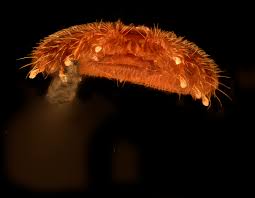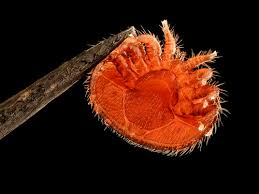
Printable edition
- President’s Message, February 2021

Well this has been fun! We are all becoming "Zoom comfortable," and are reaching out as beekeepers in new and interesting ways. This week, I participated in a few association meetings, listened to a 2-hour presentation on VitaPharma products, and heard wonderful talks from Zac Lamas, Parks Talley and Daniel Smith. Maureen Jais-Mick has been collecting local county club meeting information and sharing it, so if your club has a presentation they are willing to open up to other MSBA members, please let her know two weeks in advance.
This is one of the best things that has happened due to being in a pandemic. Learning opportunities are opening up, without worrying about driving times, parking, gas. If you are willing to use your computer in the evening, you can participate in multiple club meetings.
Short courses are starting now, and new beekeepers are joining our associations. Please consider reaching out as a mentor to a new local beekeeper. It helps remind us of why we enjoy beekeeping, and helps to make others more successful. At its foundation, MSBA was created to provide EDUCATION. That is our charter, and we endeavor to help spread best beekeeping practices, and new information at all our meetings.
Our latest Board meeting was held Jan 15. In it, the board made several decisions which everyone should be aware of:
- As an association we will donate $1 for every paid member as of February 1 of each year to the Maryland Apiary Inspection Fund. As of today that donation will be $865 (we have 865 paid yearly and lifetime members). This money is only used to provide additional seasonal inspector hours. Our inspectors are an important part of successful beekeeping in this state, and we hope they know MSBA appreciates and supports them.
- We created a small volunteer team (Kim Mehalick, Fred Smith, Jan Day, Debbie Hewitt and David Kyger) to work with Mark Dykes (UMD/Bee Squad) to collaboratively develop more classes for Maryland beekeepers. Our goal to is put 5 new classes in place this year. If you have a specific topic you want explored, please contact beesquad@umd.edu and mention this effort.
- We are offering a wonderful 2.5 hour workshop on queens with Celia Davis and Adam Finkelstein on February 14 in addition to our regular meeting (see the article here). Celia Davis is such a wonderful speaker, we wanted to pair her with a queen bee breeder. Adam Finkelstein will complete the workshop. It should be fantastic.
Fred Smith has starting laying out the meeting programmes for the next year, and there are some interesting speakers heading our way. Look out for email notices as the classes are announced, and ready.
The dandelions are in bloom in my front yard, along with daffodils. The skunk cabbage is about ready to get started...it is almost time for a new beekeeping season. Spring is my favorite time of beekeeping! Temperatures are moderate, bees are sweet. I love meeting new queens, and assessing their first laying patterns. Go out and enjoy your ladies!
Notes from the Apiary Inspector
- Notes from the Apiary Inspector
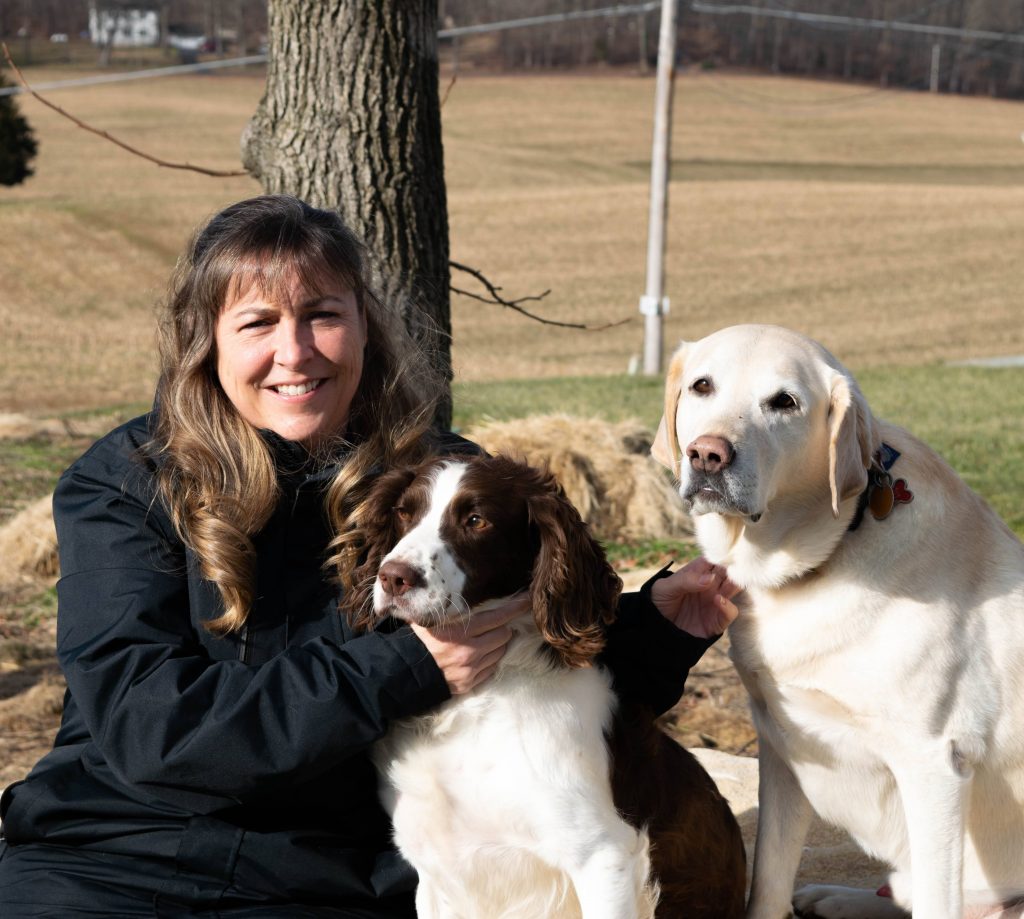
Cybil Preston, State Apiary Inspector, MDA
Phone 410-841-5920, Fax 841-5835, Cell 410-562-34642020 Maryland Beekeeping Statistics:
- 2,160 Beekeepers registered
- 2,706 Apiaries
- 16,494 honeybee colonies registered
- 192 Apiaries were inspected despite COVID-19 Restrictions!
In December, the Maryland Department of Agriculture sent out the annual registration letter and registration form to all beekeepers who have been active in the last 5 years! Please send in or email me your signed registration if you have not already done so.We are now in the process of sending out the second mailing: this 2nd notice will be sent to those who did not return the 1st registration. It is worth it to respond! We make our Inspectors lists by the middle of March so please get your registration forms in ASAP. And again: Please send in your updated form.This season has been similar to last year. With the long stretches of cold weather which we have had, it would not be surprising to hear of higher losses. When the temperatures are too cold , it can be difficult for the bees to move to their food stores. Cold weather is also hard on colonies that are too weak or that have clusters that are too small. It all remains to be seen!I have also been inspecting late fall and December dead outs, and am observing high numbers of varroa mites in the dead brood and the small clusters that are left behind. I again fear a high winter loss rate for 2020 into 2021.Nucleus colony inspections: Please remember that if you are purchasing nucleus colonies from out of state you will need to have them inspected prior to them entering the State of Maryland.Also nucleus colony suppliers are asked to contact me to get on the inspection list. If nucleus colonies are made in Maryland and sold to an out of state beekeeper, they must be inspected before movement across state lines. The beekeeper selling nucleus colonies is responsible for finding out from the buyer where it is going.Bee clubs: please also take a look at your suppliers list! If you are publishing a list of local beekeepers who are selling nucleus colonies or packages, please be sure the supplier is registered with the MDA. I have seen a few bee suppliers that are not current with their Maryland Registration.
I have been inspecting with the dogs, too! Mack and Tukka have inspected and certified 2,500 colonies so far this winter!
Special Zoom Workshop February 14: Queens with Celia Davis and Adam Finkelstein
- 2021 February 14 Celia Davis and Adam Finkelstein on Queens: WORKSHOP
WHAT: Online Zoom Workshop
TOPIC 1: Anatomy and Life of QUEENS
TOPIC 2: Heredity for Healthy Bees
DAY: 02/14/2021 Sunday, February 14, 2021
TIME: 2 PM - 4:30 PM
WHERE: On-line via Zoom (CLICK to REGISTER)
COST: Suggested donation of $5 or more
NOTE: ADVANCE REGISTRATION is REQUIRED. After registering, you will immediately receive directions to join the meeting.On Sunday, February 14 from 2 PM to 4:30 PM, MSBA is hosting a special "pay what you wish" Zoom workshop featuring Celia Davis, February 2021 keynote speaker, and Adam Finkelstein of VP Queen Bees. We are asking attendees to consider a donation of $5 or more to support additional workshop programming from MSBA. Each talk is scheduled for about 45 minutes, followed by Q&A, with a short break between sessions.
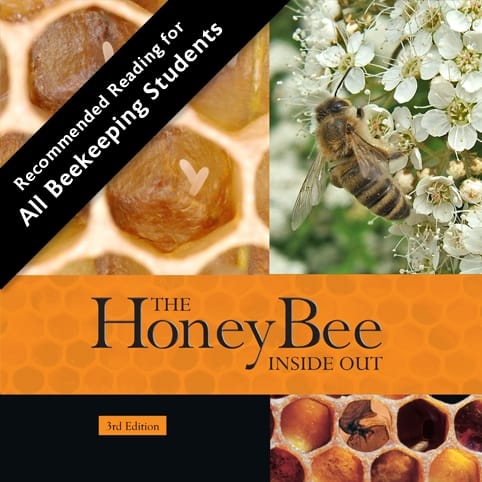
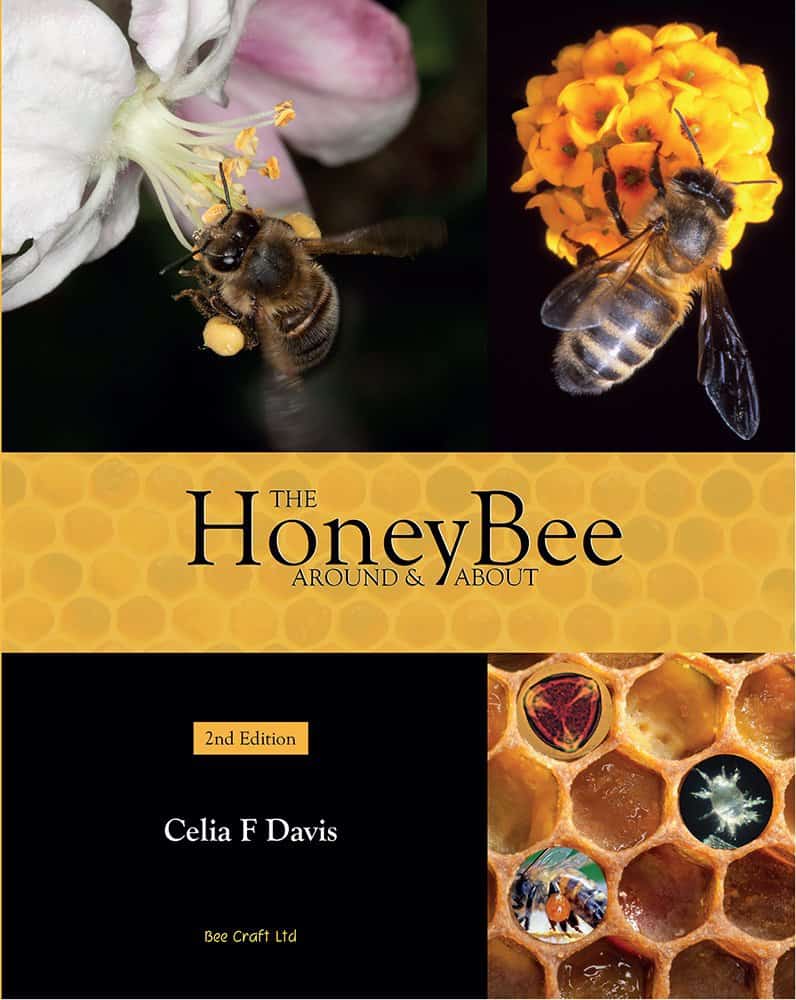
 Celia Davis will present on one of her favorite topics, "The World of the Honey Bee Queen," focusing on the anatomical structure and life of the honey bee queen, and practical ways to ensure that colonies are headed by fertile, productive queens. Celia Davis is one of the most honored and treasured voices among British beekeepers and has been keeping bees for more than 35 years. Celia has authored two bee books, The Honey Bee - Around and About, and The Honey Bee Inside Out and lectures throughout the British Isles and Ireland.
Celia Davis will present on one of her favorite topics, "The World of the Honey Bee Queen," focusing on the anatomical structure and life of the honey bee queen, and practical ways to ensure that colonies are headed by fertile, productive queens. Celia Davis is one of the most honored and treasured voices among British beekeepers and has been keeping bees for more than 35 years. Celia has authored two bee books, The Honey Bee - Around and About, and The Honey Bee Inside Out and lectures throughout the British Isles and Ireland. 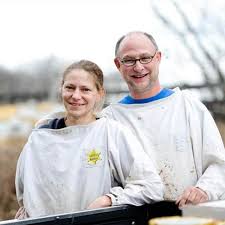 Adam Finkelstein will give a talk on "The Roles Heredity and Selection Play in Successful Apiculture." Many Maryland beekeepers will recognize Adam Finkelstein from his and Kelly Rausch's many years of work among us! Previously speaking to MSBA about assessing lines of queens in 2013, and now located in South Carolina, Adam will follow up Celia Davis' discussion of queen bee biology with a talk about the importance and significance that heredity and selection have in producing high quality stock needed to maintain healthy and successful apiaries.
Adam Finkelstein will give a talk on "The Roles Heredity and Selection Play in Successful Apiculture." Many Maryland beekeepers will recognize Adam Finkelstein from his and Kelly Rausch's many years of work among us! Previously speaking to MSBA about assessing lines of queens in 2013, and now located in South Carolina, Adam will follow up Celia Davis' discussion of queen bee biology with a talk about the importance and significance that heredity and selection have in producing high quality stock needed to maintain healthy and successful apiaries.This session will be hosted with support from the UMD Bee Squad.
MSBA: Looking Back and Forward
- About the MSBA: History and Today
by Kim Mehalick, MSBA President
The Maryland State Beekeepers Association is a non-profit organization that has been dedicated to the advancement of beekeeping and the improvement of beekeeping skills in Maryland since 1908. This article is meant to give some perspective on where we have been, and what we are working on these days.
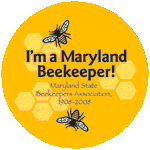
In the 1970’s and 1980s beekeeping became a less common interest and the numbers of beekeepers became smaller and smaller, especially after the introduction of the varroa mite into the United States. The varroa mite devastated colonies throughout the country, and eliminated many backyard beekeepers. Back in the 1980s, MSBA became one of very few sources for new beekeepers to receive an introduction and attend short courses. Thankfully, times have changed and now we have a plethora of state and regional groups that provide short courses each year for new beekeepers.
In 1986 the MSBA was formalized and officially incorporated and its first three directors were Ann Harman, Richard Hammond and Gordon Davis. We owe of what MSBA has become to the hard work and the vision of these and other founding members.
The primary goals of the newly incorporated Maryland State Beekeepers Assocation, Inc., were:
(a) to promote the values and pleasure of beekeeping among the public;
(b) to inform the public and those in the Association of matters of importance in beekeeping;
(c) to encourage scientific and practical beekeeping, and the improvement of bee culture;
(d) to educate beekeepers and those interested in bee culture by presenting and discussing new ideas; and exchanging information, goods, and services;
(e) to support research on bee culture;
(f) to protect bees and sources of nectar and pollen;
(g) to serve as liaison with other organizations concerned with bee culture;
(h) to advance, in general, the interests of its members.
An all-volunteer organization from the beginning, MSBA continues its role of education, and outreach within the state. Currently nearly 1,000 members strong, MSBA invites leaders in beekeeping science and practice to speak to three membership meetings a year, provides additional educational opportunities, and provides outreach to support Apis mellifera, the honey bee.
MSBA continues to have a strong relationship with the University of Maryland, home of the first meeting in 1908. MSBA continues to lobby for beekeepers, thru both the Maryland Farm Bureau and the Maryland Department of Agriculture. Our goal is to both support and represent the needs of Maryland beekeepers.
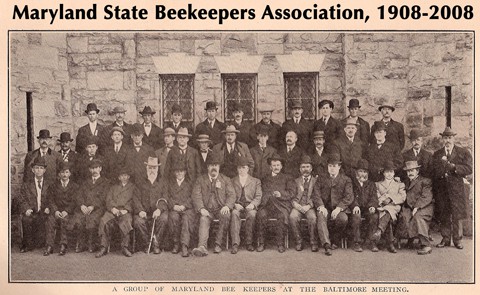
1908 founding meeting of MSBA Your membership in MSBA is an honor and an incentive to continue working for Maryland's bees and beekeepers, and your participation and feedback is valuable to us as we move into the future.

Current MSBA beekeepers at EAS 2019 You can find your local County Second VP and the contact info for the entire MSBA Board of Directors on our "about us" page, and we hope to hear from you soon and continue serving you and your bees always.
Eastern Shore Feral Hive Rescue Adventure
- An Eastern Shore Feral Tree Colony Rescue Adventure
by Mary Laura Fitzgerald
The call came in on September 16th last fall from a farmer in Massey on the Eastern Shore. He had cut down a tree, only to discover bees in it. Luckily, he decided to call a beekeeper to "re-home" the colony.
I’ve seen plenty of videos on cutouts from logs, so I headed over to take a look, optimistically hoping it was something I could manage (possibly with the help of a chainsaw owner).
After a crazy, conquering beekeeping summer last year, I was pretty much up for anything. The scope of the situation turned out to be daunting, however.
When I got onsite and looked at the cut tree, I had a lot to think about.
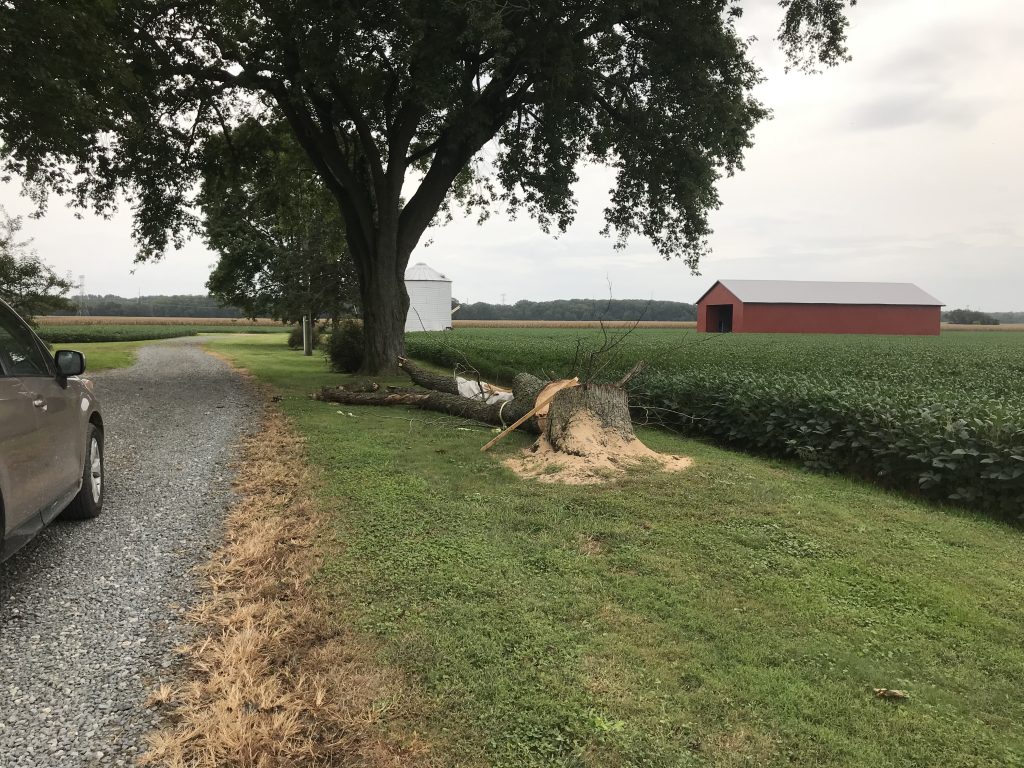
It was a big, beautiful colony with super sweet girls. It had to go because it was right up against a soy field, and the soy would need to come down eventually. It was starting to get cool for long, involved cutouts, and the farmer was eager to have them saved.
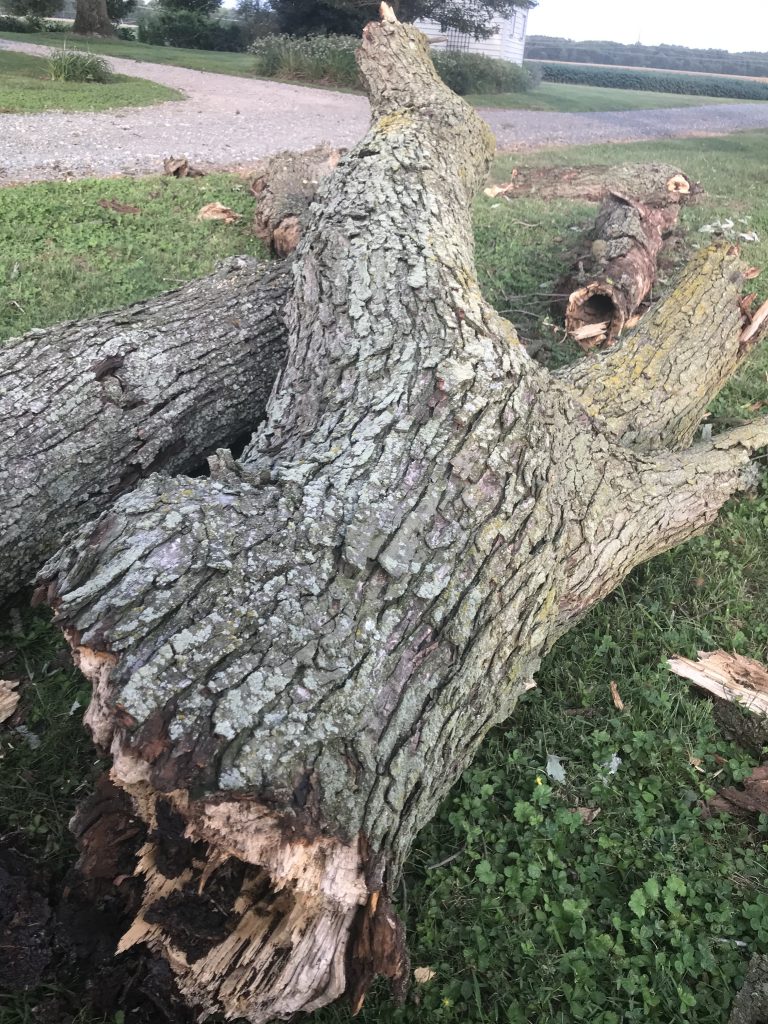
I covered the openings with a tarp to cut down on the possibility of robbing and headed home for a conversation with two experienced beekeeping friends. We all came to the conclusion this was probably more than I could handle alone.
I put out a request through the local Facebook group, asking for someone who would like to help me get them out of the tree, but I got no takers right away. Finally a response came in from Dave Elkner (President of the South Jersey Beekeepers and Second VP of the New Jersey Beekeepers Association). He suggested the whole log be moved and stood up for the winter, and kindly pointed out I had my work cut out for me! That was progress, but I still had a situation that was looking impossible for me to do. I was desperate to save those girls!
Happily, a short time later, Dave said he could come down and help, in exchange for grafting off the queen if they made it through the winter. That was one major hurdle, but there were still some major logistics to handle.
Dave is a busy man with over 100 hives of his own, and he lives in New Jersey. Not only that, we needed equipment, and the tree segment and colony had to be transported to my yard about 20 minutes away...OR, if we couldn't do that, we needed the farmer to agree that we could move it to an out of the way place on his farm and then come get it in the Spring.
The upcoming weather was looking bad, and my yard has a “moat” at the bottom of a hill which can be difficult to navigate when it’s muddy. I was super stressed, but I started chipping away at the details.
For one thing, I needed equipment, but the farmer had a variety of equipment that might move a hive, as well as a chain saw, and he was eager to help. He also thought that he could find a location on his farm if necessary. Dave was willing to carve out a small window of time early in the morning on a weekend. So the plans were firm!
I gathered up the things we needed, and nine days after the farmer’s phone call, we were ready to go. I texted the farmer the night before to remind him about the time and the equipment we needed. Dave’s son is in the military and was given unexpected leave that weekend, so Dave wanted to be in and out quickly, and on the way back home as soon as possible. Also, it was going to rain and Dave said the plans were off if it was raining. I didn’t sleep!
Early the next morning, I headed to Massey. It had rained, but stopped when I got there, though more rain was expected. Dave arrived and we headed up the lane.
But: No farmer, no equipment, rain clouds building up again! I tried calling, and there was no answer. Dave was looking ready to go, and I saw the whole rescue starting to crumble!
Finally, someone let the dog out at the farmer’s house, and the dog barked. The upstairs window shade shot up, and the farmer came down, dressing as he went. I started breathing again, and we were off!
The farmer was brave enough to wear my old jacket that wouldn’t zip while he sawed the tree down to the edges of the colony, and flattened the bottom.
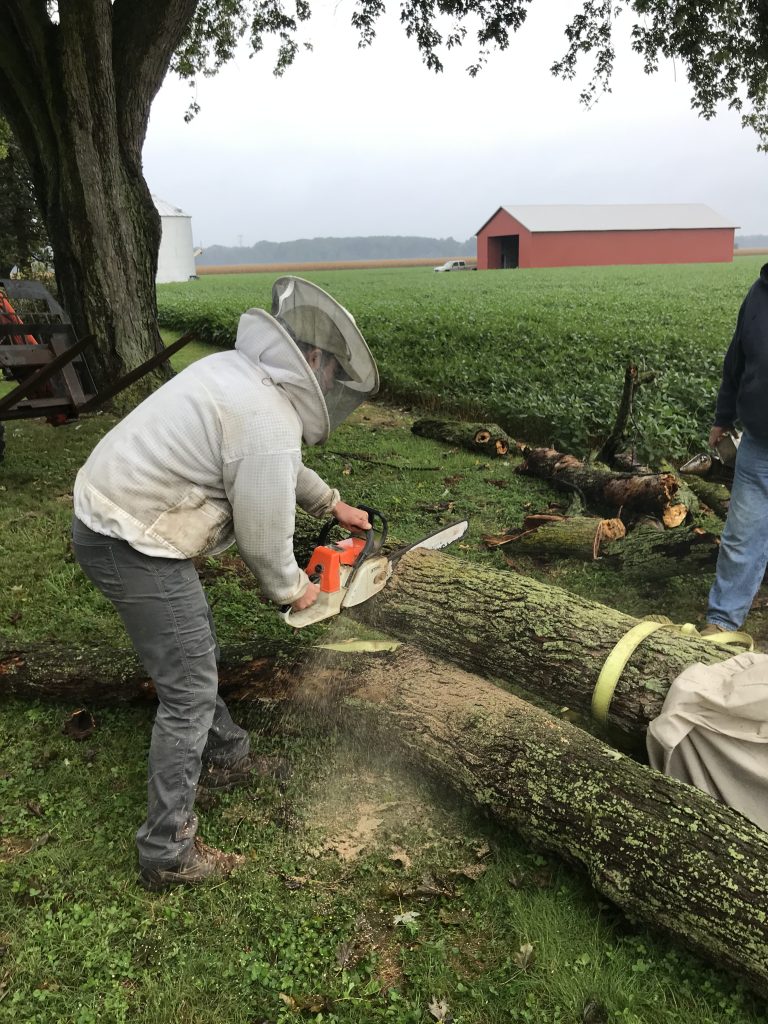
We got the tree up into the truck and screwed plywood on the bottom. It started to rain again, but stopped when we got to my yard, and David made it through the moat.
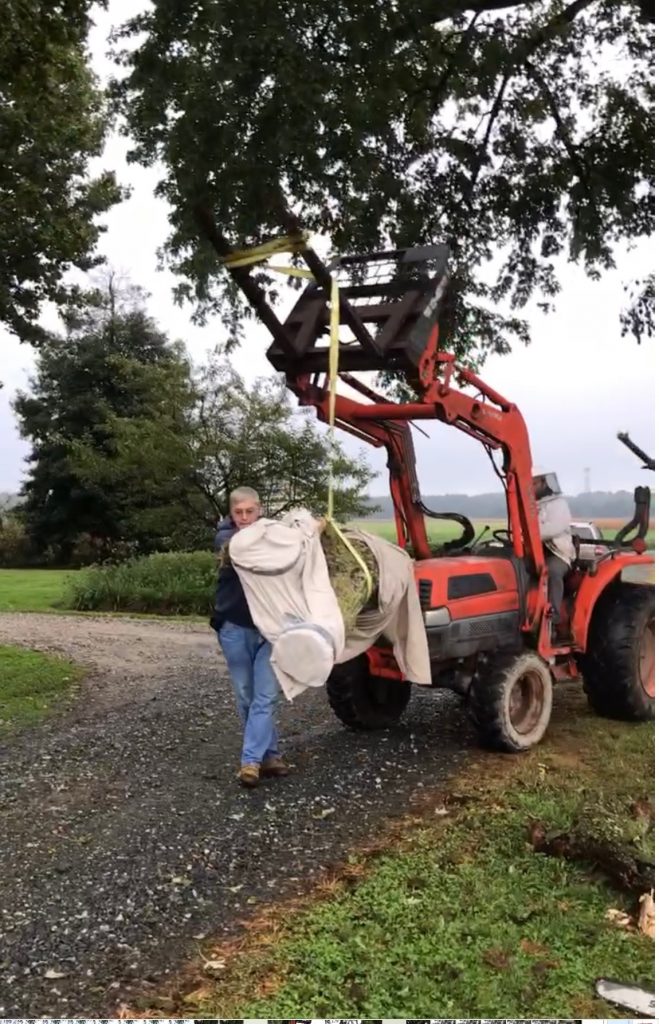
The last remaining tricky thing was for the two of us to slip the several-hundred-pound log out of the truck and land it perfectly on several cinder blocks. Once we pushed, there was no do over!
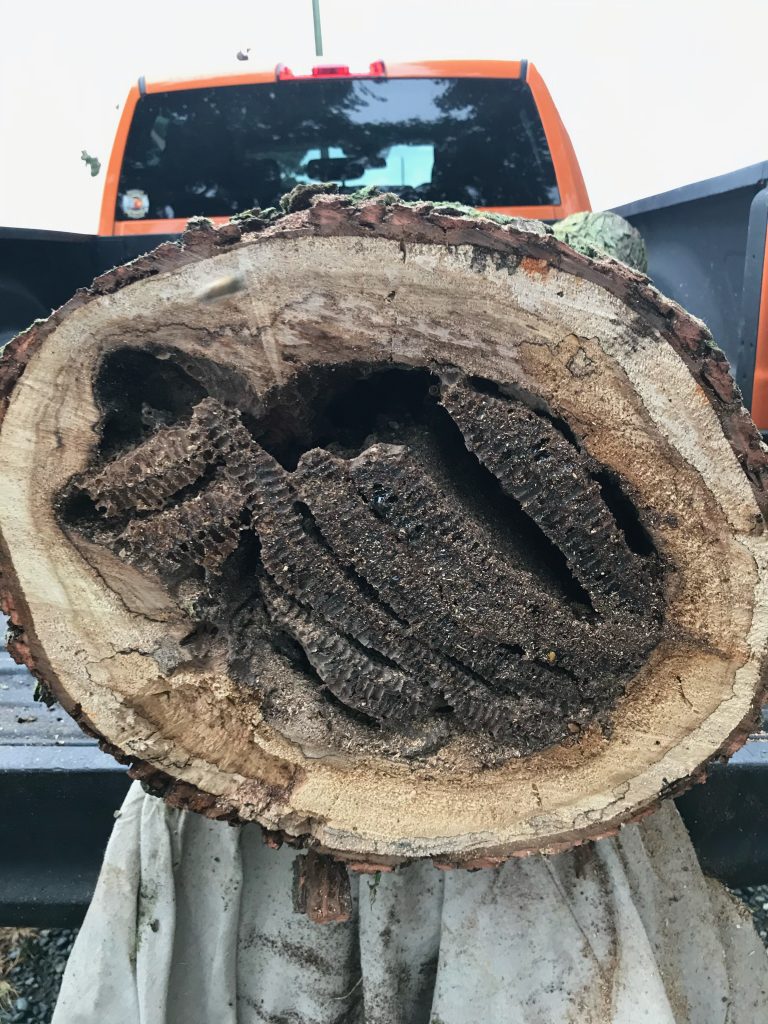
Thankfully, we landed it perfectly. So far, the log bees seem to be doing well!
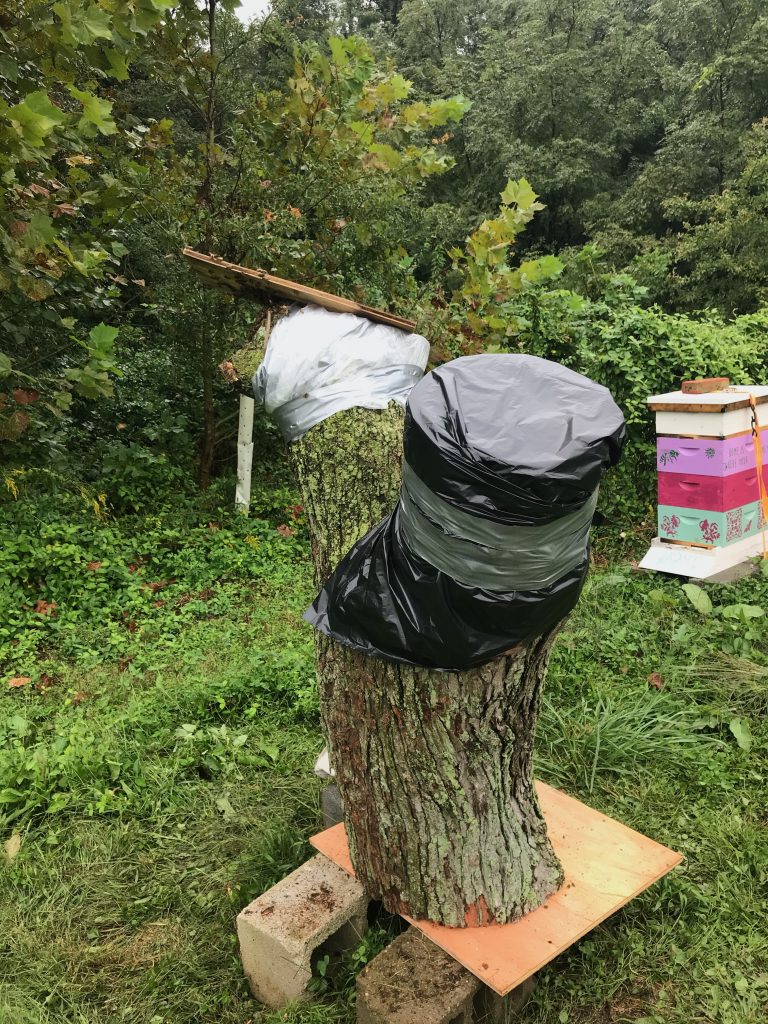
If they get through the winter, the next challenge will be getting them out of the tree, and Dave Elkner can do his well deserved grafting!
News from the UMD Bee Squad
- UMD Bee Squad Update Winter 2021

Hello from the University of Maryland Honey Bee Lab! We hope everyone has had a good winter so far. We are using this “slow” time of the year to prepare for grant submissions and to get our equipment ready for the upcoming season.
The Bee Squad has been busy working with varroacide manufacturers to set up webinars to discuss their mite treatment products. We still have several to go so head on over to UMDbeesquad.com to sign up for the upcoming sessions. If you’d like to catch up on previous sessions, check out our YouTube channel (click on the link or search for UMD Bee Squad in the app). We will post all of the series along with other exciting new videos.
With spring fast approaching, the Bee Squad is also working on providing resources for beekeepers here in Maryland. At the request of the industry, we will be releasing a short recorded talk on resources available for beekeepers to help with planning your approach to Varroa management. This will be released in the spring to help new beekeepers prior to picking up their packages and nucs.
In addition to this talk, the Bee Squad is working with the MSBA to bring beekeepers more educational opportunities. These will come in the form of online and in-person classes (when we are able!). Keep an eye out on your email and on the Bee Squad’s website and Facebook pages for more information.
Finally, as many of you know Kelly Kulhanek recently graduated with her PhD. We’d like to congratulate Dr. Kulhanek on all her hard work and look forward to working with her in the future.
That’s all for now, but we encourage you to reach out to us if you have any questions and we look forward to a great 2021 for the bees!
New Book from MSBA's Ben Cooper
- Created Critters with Wings: a beautiful new book from beekeeper Ben Cooper
 Ben Cooper has long been an important teacher, mentor and beekeeper in the Western Maryland apiculture community, as well as a member of the MSBA Board. He is also an author: he published All Nature Sings in 2018 (which of course includes honey bees) and recently published an absolutely gorgeous children's rhyming picture book, Created Critters with Wings.
Ben Cooper has long been an important teacher, mentor and beekeeper in the Western Maryland apiculture community, as well as a member of the MSBA Board. He is also an author: he published All Nature Sings in 2018 (which of course includes honey bees) and recently published an absolutely gorgeous children's rhyming picture book, Created Critters with Wings. 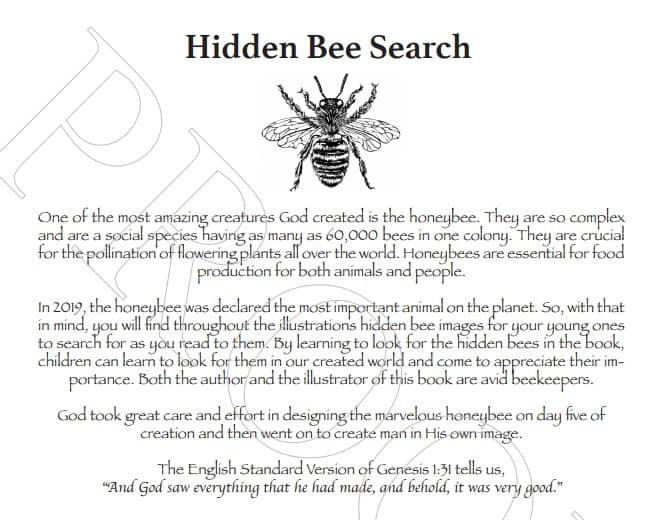 Both Ben and the illustrator, Sandy Arnold, are avid beekeepers, and each page includes hidden bees for kids to look for and find.
Both Ben and the illustrator, Sandy Arnold, are avid beekeepers, and each page includes hidden bees for kids to look for and find. You can download a PDF preview of Ben's book, and his publisher also created an educational enrichment activities book as a companion to the book. http://shinealightpress.com/shop/
Please join MSBA in congratulating Ben on yet another wonderful creative contribution to our community and the world!
Special Section: Maryland Has Class(es)!
The pandemic has not stopped Maryland beekeeping associations from continuing their educational mission, each in its own way and with ideas to offer us all. These are also educational opportunities to share with would be newbees across The Free State!
- Anne Arundel Beginners Course: Online and Face to Face
from Deborah Hewitt, MSBA Director
The Anne Arundel Beekeepers Association (AABA) has had to adjust to COVID times and go online for meetings and our Short Course – except for an optional equipment lab and the final field day in spring when students will meet the bees.
Purchasing equipment is a major investment, and we thought students should have the ability to see, touch - and even lift - before they buy.
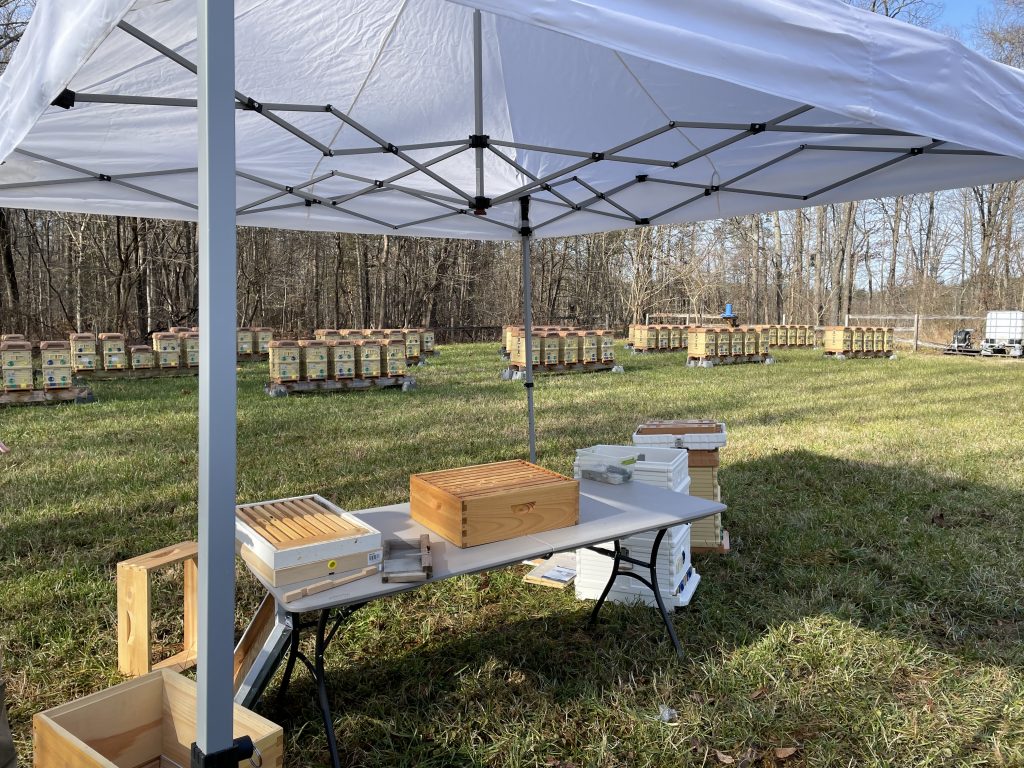
AABA's new president, Ryan Smith, offered to host the Short Course Equipment Lab at his apiary, HoneySmith Bees, since our normal apiary at Arlington Echo wasn't open to us. We were fortunate to have one of the mild winter Saturdays, and even a few bees were flying in to explore. There were three tents well-spaced in the field with ~100 nuc colonies providing a backdrop.
The first tent had Langstroth hive components in traditional wood and the Apimaye insulated plastic hive. Students could compare 8-frame versus 10-frame, medium versus deep boxes, and solid versus screen bottom boards. Dennis Roundy brought in a super of honey for students to heft.
The second tent had protective gear for students to see veils, jackets and suits in both regular and ventilated styles as well as gloves, smokers, and hive tools, and even a varroa easy check. There were frame and foundation options, and a brood box with combs of various stages of completion and ages to compare - even the start of a foundationless frame.
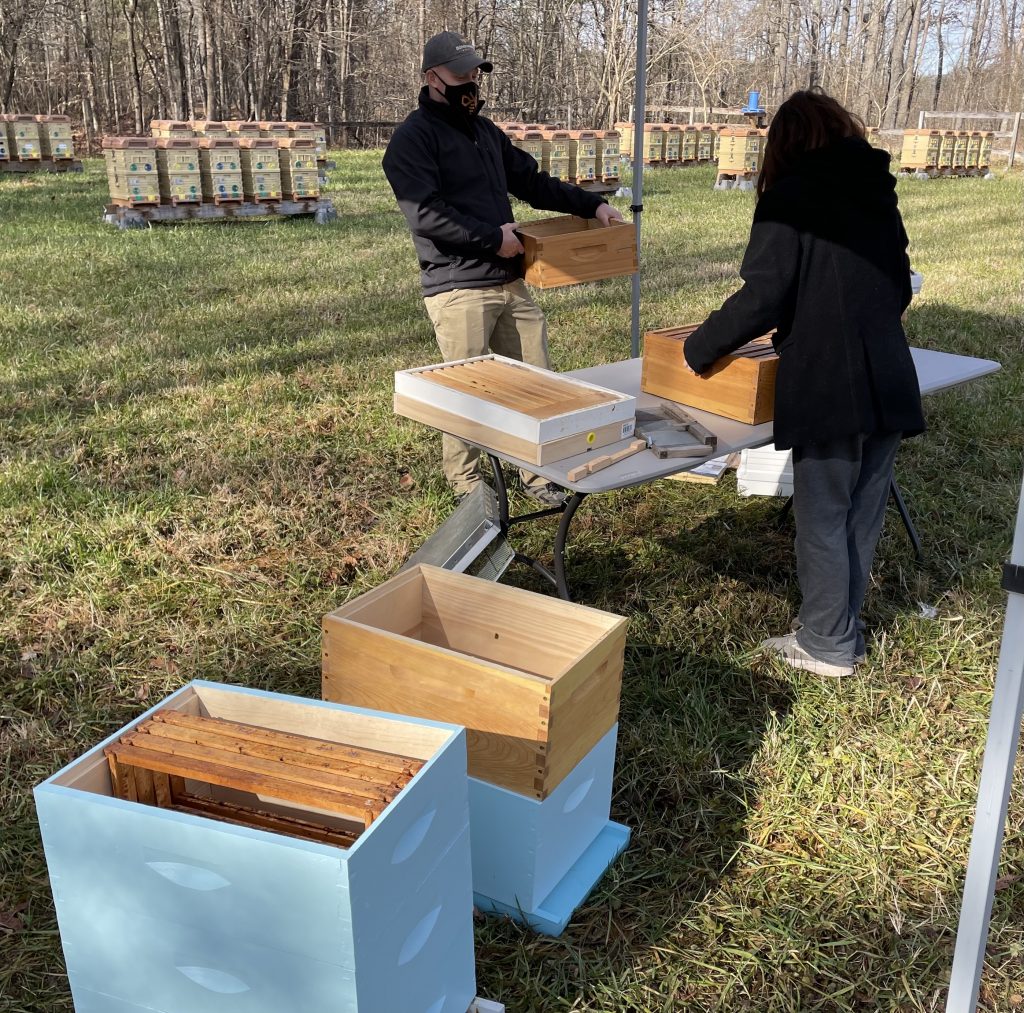
The last tent housed different feeder systems for comparing the pros and cons of each. There were also wooden and cardboard nuc boxes and package boxes to show how the bees would arrive or for keeping nucs in the apiary. We included queen excluders and escape boards as extra equipment to consider for season two.
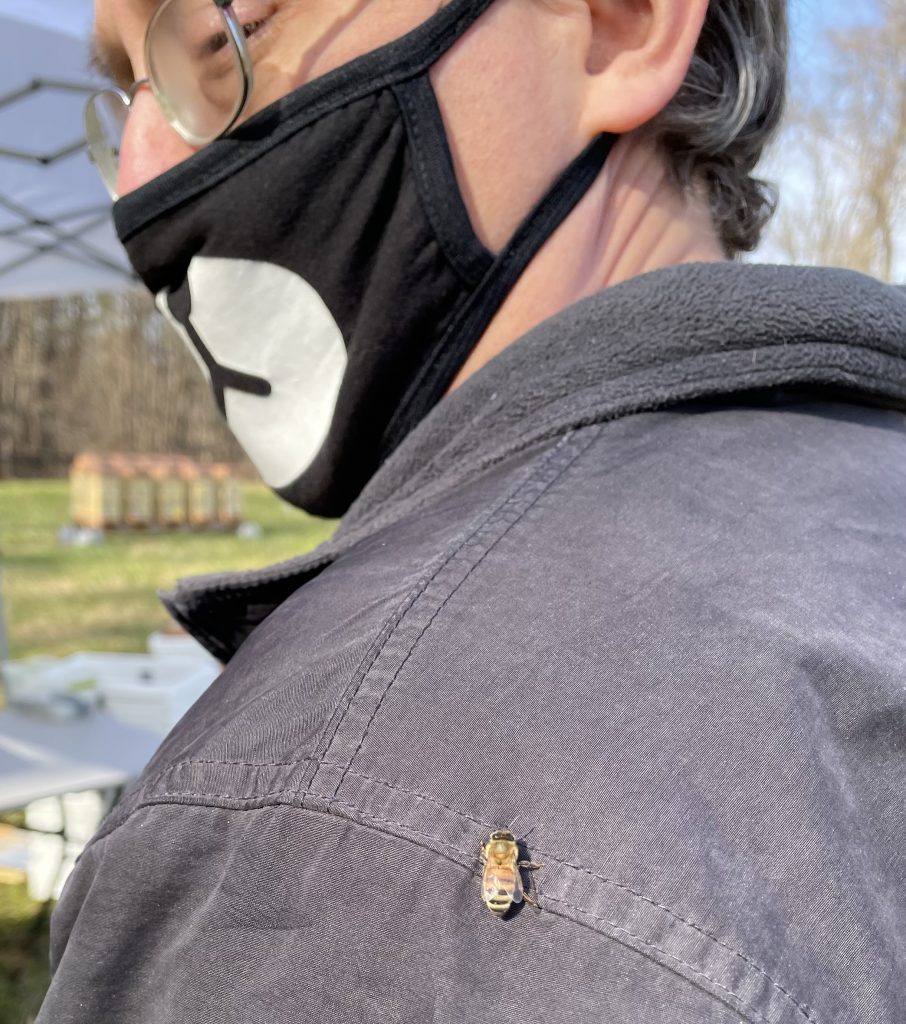
Just beyond the tents we had other hive options with a Long Langstroth Hive that was provided by Kim Mehalick and a Layens Hive built by AABA member Dan Sawyer. There was also a Warre hive and a "too small" top bar hive displayed to make students aware of comb dimensions so bees can build a proper brood nest with overhead winter stores (and avoid the swarm factor).
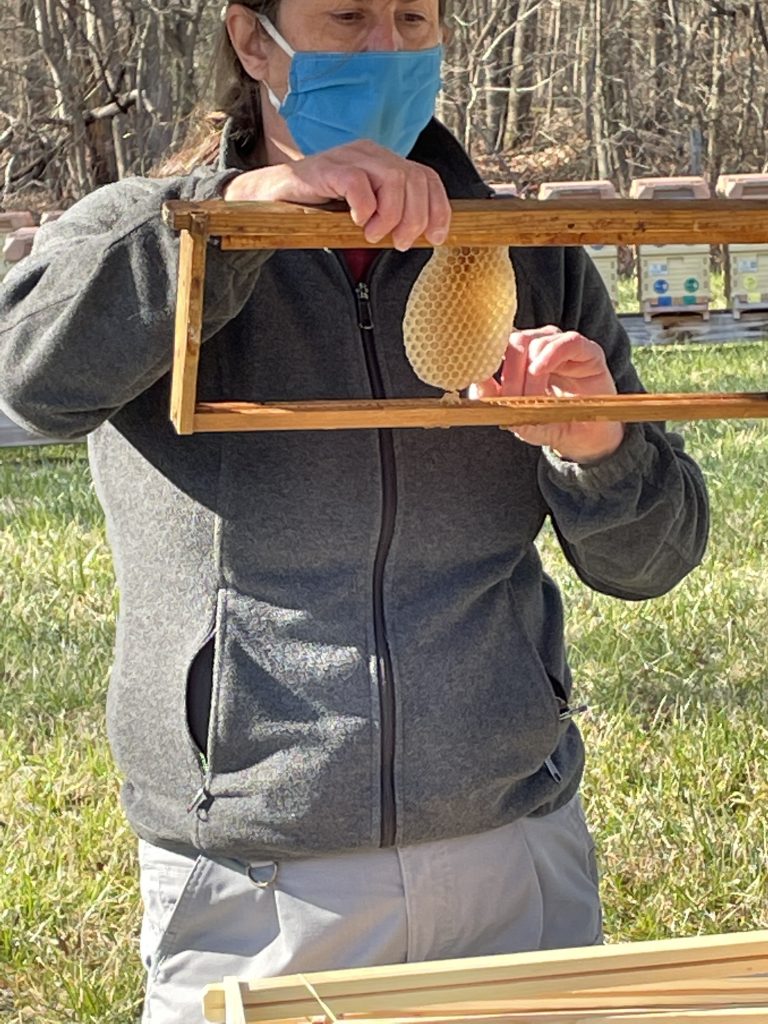
We divided the day into three sessions with an hour and a half between each and had between 12 and 16 students arriving each for each session where they divided again to small groups at each station and then rotated. Time slots were decided by a zoom poll during the first meeting and students divided fairly evenly.
Thanks to the Chiappelli family for the photos and they gave permission to share them!
- Western Maryland Beginners Class at Allegany College
Western Maryland Beekeeping classes will be offered in Cumberland at Allegany College of Maryland beginning March 22, 2021 and run each Monday evening through April 26, 2021. Classes begin at 6:00 PM and go until 8:30 PM.
The cost for the Beginning Beekeeping class is $55, and that includes the book. The class can be used as continuing education credit for Maryland science teachers!
We are meeting in person and mask protocol is required for indoor sessions. Due to COVID restrictions, the course is limited to 13 seats. Call the ACM Continuing Education Department to confirm available enrollment. Their number is 301-784-5279, or email cooperville@atlanticbb.net for questions.
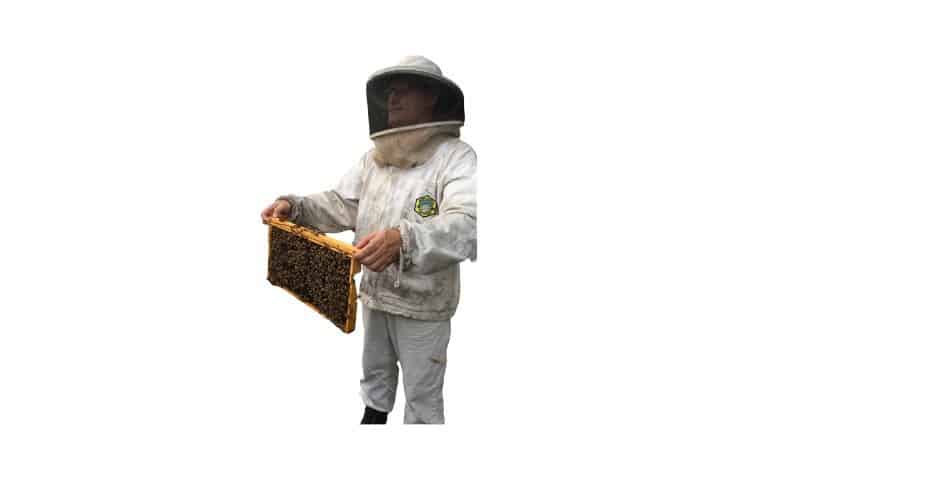
- Susquehanna Beekeepers Association offering Intro to Beekeeping Class
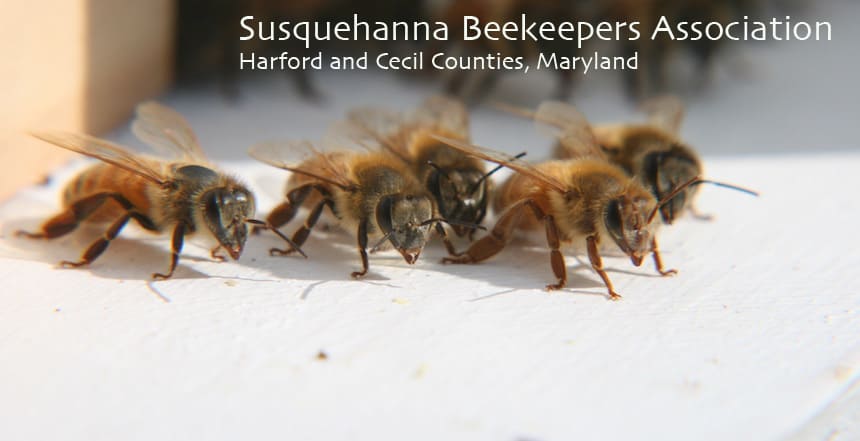
Http://susquehannabeekeepers.com/ The Susquehanna Beekeepers Association is offering an online "Intro to Beekeeping Class in cooperation with Harford Community College!
The course introduces students to the basics of beekeeping. Topics include starting a beekeeping business, assembling and maintaining equipment, examining honeybees, manipulating hives, and managing diseases and parasites that affect honeybees.
Senior citizen and disabled retiree course fee waivers apply. The materials fee includes a one year membership in the Susquehanna Beekeepers Association. Last session meets on Saturday, 9 a.m. - 3 p.m., and will be spent at a local bee yard for hands-on experience in examining and manipulating hives. Classes are online Fridays from March 5th to April 23 7-9 pm Cost: $60 Course # 25060
You can register for this class through Harford Community College at:
The instructor for this class is the Maryland State Bee Inspector, Cybil Preston! For questions, please contact John Knapstein 410-692-9823 or jdk920488@gmail.com
- BUMBA is Zooming Again in Prince Georges County
After switching to online in the middle of the 2020 Beginners Course, BUMBA (the Bowie-Upper Marlboro Beekeepers Association) is doing their short course online using Zoom and Google Classroom, but with some live sessions and some videos they are making for the class.
The club bought a dedicated camera and laptop in order to loan these tools out to instructors to create course content. BUMBA considers this an experiment, and will take a look later on how well it worked and lessons learned.
The link to the registration page is http://bumbabees.com/shortcourse_2021.html
- Association of Southern MD Beekeepers Teaching at College of Southern Maryland Online
The Association of Southern Maryland Beekeepers is partnering with the online arm of the College of Southern Maryland (which is also a Bee Campus USA!) to offer its beginning beekeeping course this year.
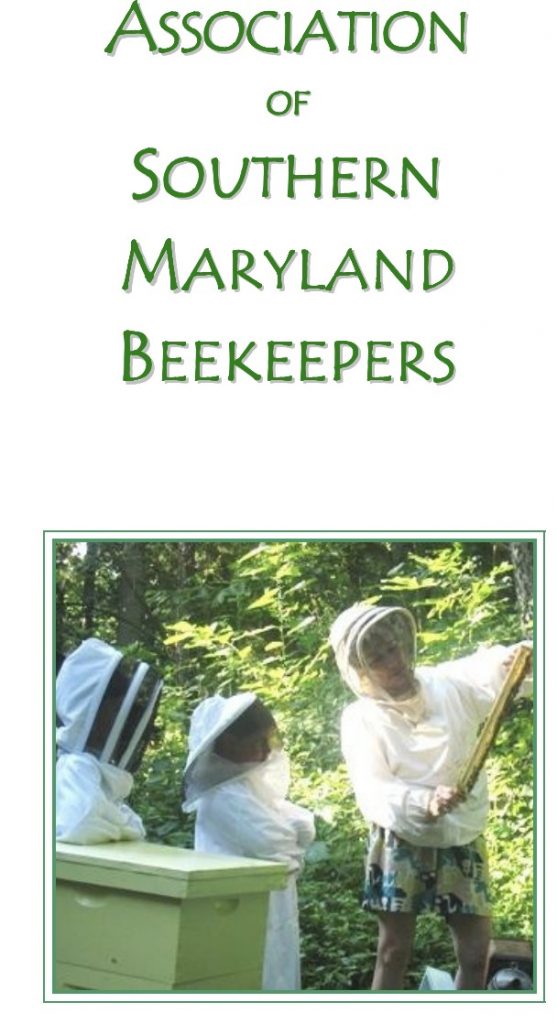
Designed for those interested in getting started in beekeeping.
Subject material including basic honey bee biology and behavior, beekeeping equipment, pests, hive inspection and seasonal management will all be covered.
The overall goal is to provide information that will allow you to learn from your bees as you work the hive. Successful beekeeping is a combination of knowledge and intuition.
Join us for Beekeeping and gain basic knowledge to build confidence and to help ensure overall success.
This class is taught in partnership with the Association of Southern Maryland Beekeepers (ASMB). A 1 year membership with ASMB is included in the cost of the class. Recommended textbook is The Bee Keepers Handbook by Diana Sammataro and Alphonse Avitabile.
Course information, including a link to register, is:
2021 BEEKEEPING SHORT COURSE
College of Southern Maryland ONLINE- ZOOM
Course AAA-8100-72019
Cost $50
Sat. 9AM - noon, Feb.20-Mar. 6 (see catalog p. 14) - Live Beekeeping Instruction Demos in Baltimore
from Bill Castro, MSBA 2nd VP
Though exact dates that highly depend on covid, weather and city/state requirements are still being worked out, MSBA 2nd VP Bill Castro will be holding live demos on urban natural beekeeping in Baltimore's Leakin Park this year.
The first sessions will be in late March, and take place every month this growing season. This is Bill's 13th full time season running over 100 colonies in Baltimore and 25th consecutive season managing bees.
Topics will include hive management, swarm retrieval/trapping, making seasonal splits, strategic and humane honey harvesting, and answering questions.
Folks interested can look for updates on the Bee Friendly Apiary website and Facebook page, and Baltimore Beekeepers Facebook page. I can also be emailed at billiam1969@beefriendlyapiary.com for more information as the details become available.
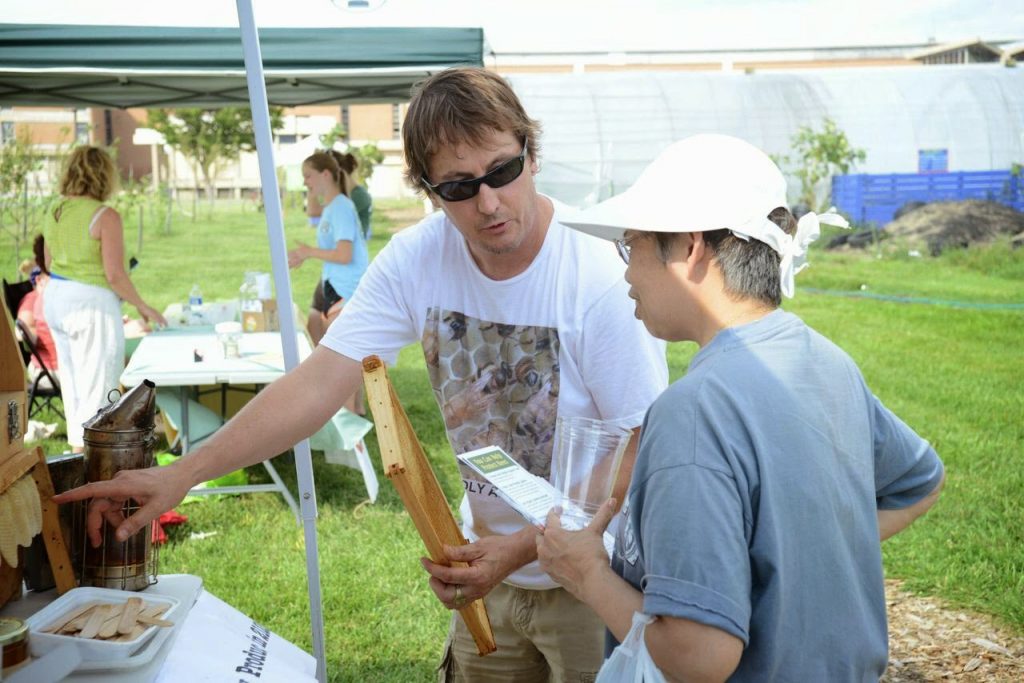
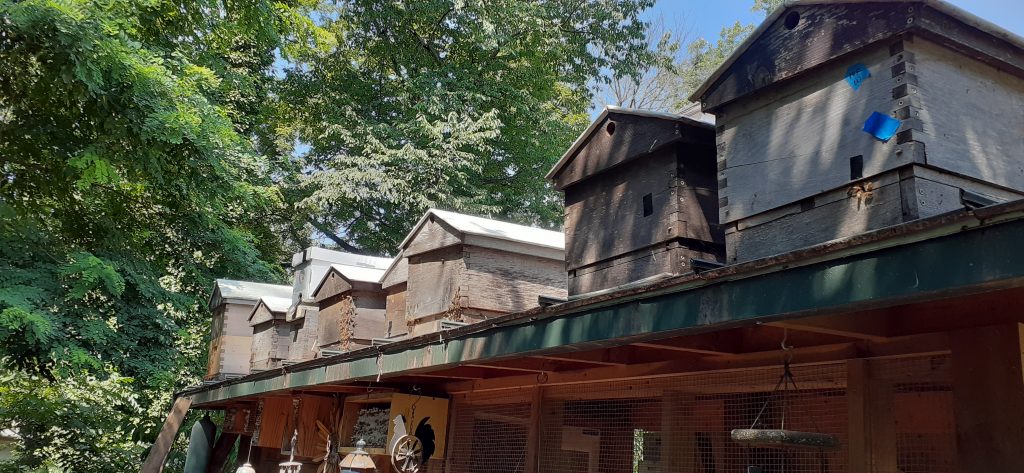
Beekeeping News and Notes
- Beekeeping News and Notes: February 2021
Not Bees or Homicidal Hornets but...Periodical Cicadas!
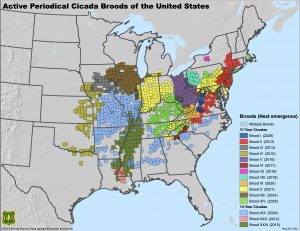
US Cicada Brood, from USDA Forest Service
Buckle up, Mid-Atlantic arthropod advocates, our 17-year-periodical-cicada party is about to start! The yellow areas of the map above are the regions associated with the Brood XXI of the periodical cicadas, last seen in great numbers here in 2021. Three species are involved: Magicicada septendecim, Magicicada cassini and Magicicada septendecula.
Emergence typically begins in mid-May and ends in late June. We'll begin to see Brood XXI when the soil 8″ beneath the ground reaches 64 degrees Fahrenheit. A nice, warm rain will often trigger an emergence. Back in 2004, people began reporting emergences around May 13th. Learn more at Cicadamania.com
According to the National Geographic, they are good eating. Crunch crunch!
Researchers Identify Compounds Which May Trigger Hygienic Behavior
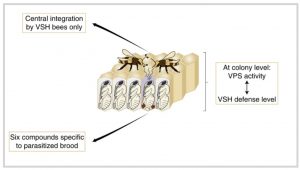 A team led by Dr. Fanny Mondet at INRAE and the University of Otago has identified 6 chemical compounds which do not occur in honey bees but whose presence apparently triggers the cleaning of cells where it is detected. Introducing the chemicals into healthy brood triggered Varroa-Sensitive Hygiene (VSH) behavior in honey bees, and appear to allow bees to discriminate between healthy and parasitized brood. According to the authors, "These findings enhance our understanding of a critical mechanism of host defense against parasites, and have the potential to apply the integration of pest management in the beekeeping sector."
A team led by Dr. Fanny Mondet at INRAE and the University of Otago has identified 6 chemical compounds which do not occur in honey bees but whose presence apparently triggers the cleaning of cells where it is detected. Introducing the chemicals into healthy brood triggered Varroa-Sensitive Hygiene (VSH) behavior in honey bees, and appear to allow bees to discriminate between healthy and parasitized brood. According to the authors, "These findings enhance our understanding of a critical mechanism of host defense against parasites, and have the potential to apply the integration of pest management in the beekeeping sector."
Honey Bee Reproduction Challenges: Trading Sperm Viability for Disease Resistance?
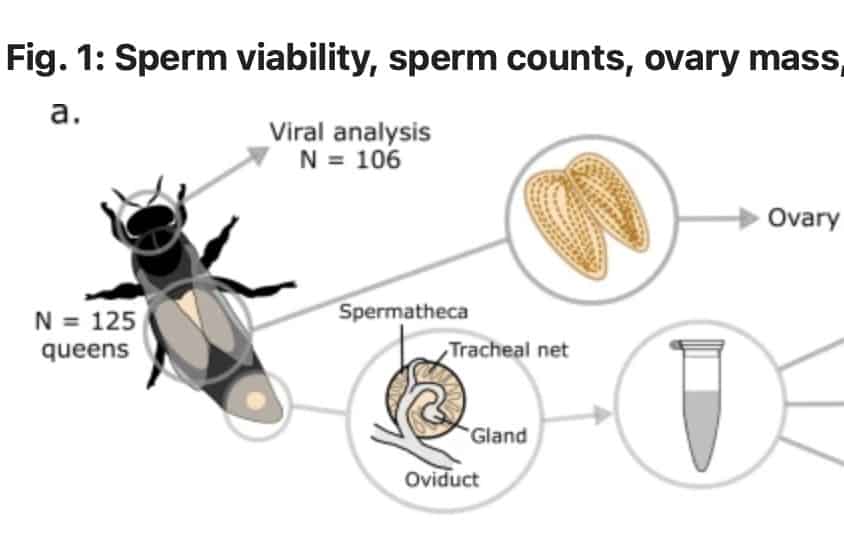
Scientists agree that queen bees are failing faster now than in the past, and adaptation to the fight against the mite may play a role. A paper published this month by researchers at North Carolina State University and the University of British Columbia in Communications Biology offers clues about what’s behind queen bee failure, finding that when sperm viability is low, the expression of a protein known to act against pathogens such as bacteria and viruses is high.
A team out of Dr. David Tarpy's lab looked at 9 lines of queens, and those rated as beekeepers as "failed" had significant differences in 5 fluid proteins in the sperm. One of them, lysozyme, is a conserved "immune effector" (a compound capable of modulating or participating in an immune response), marking this as a tradeoff between increased defense against a pathogen and decreased reproductive efficacy.
More Poop on "Murderous" Hornets
Researchers have document for the first time an extraordinary collective defense used by Apis cerana against the giant hornet Vespa soror. In response to attack by V. soror, A. cerana workers foraged for and applied spots of animal feces around their nest entrances. Fecal spotting increased after colonies were exposed either to naturally occurring attacks or to chemicals that scout hornets use to target colonies for mass attack. Spotting continued for days after attacks ceased and occurred in response to V. soror, which frequently landed at and chewed on entrances to breach nests.
The study describes a remarkable weapon in the already sophisticated portfolio of defenses that honey bees have evolved in response to the predatory threats they face. It also highlights the strong selective pressure honey bees will encounter if giant hornets, recently detected in western North America, become established.
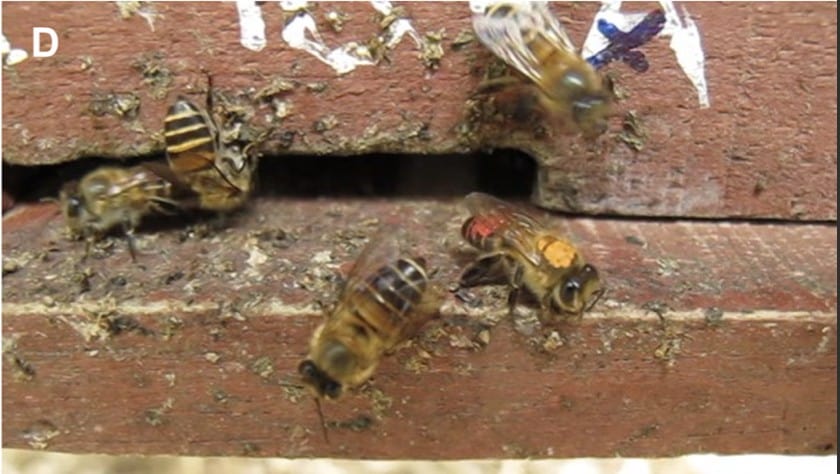 Be(e) sure to wipe your feet before entering, gals.
Be(e) sure to wipe your feet before entering, gals.
Modern Honey Bee Genome May Be MORE Diverse
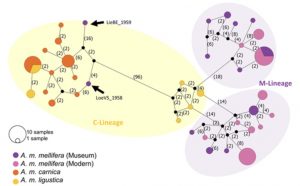 A study of both contemporary and historic Apis mellifera DNA ("Digging into the Genomic Past of Swiss Honey Bees by Whole-Genome Sequencing Museum Specimens") by Dr. Melanie Parejo at the University of the Basque Country sequenced samples of recent honey bee stocks as well as specimens dated from as long as 150 years ago to try to determine whether loss of genomic diversity is yet another threat to honey bee health and viability. This study became possible only with the advent of modern tools for sequencing fragmented historic DNA samples.
A study of both contemporary and historic Apis mellifera DNA ("Digging into the Genomic Past of Swiss Honey Bees by Whole-Genome Sequencing Museum Specimens") by Dr. Melanie Parejo at the University of the Basque Country sequenced samples of recent honey bee stocks as well as specimens dated from as long as 150 years ago to try to determine whether loss of genomic diversity is yet another threat to honey bee health and viability. This study became possible only with the advent of modern tools for sequencing fragmented historic DNA samples.The researchers expected to find a "genetic bottleneck" due to continued selection and pest/disease impacts on managed and feral honey bee populations, but instead found the inverse! It appears that genetic diversity has even slightly increased, probably due to modern apicultural practices.
The team also identified that genes linked to xenobiotics (foreign substances) appeared to have been selected over time, indicating possible selection pressure due to chemicals used in agriculture and apiculture over the last century.
Feral colonies provide clues for enhancing honey bee tolerance to pathogens
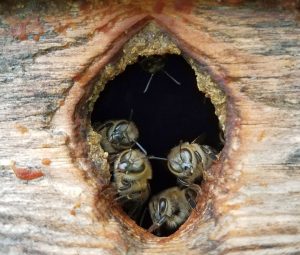 Understanding the genetic and environmental factors that enable some feral honey bee colonies to tolerate pathogens and survive the winter in the absence of beekeeping management may help lead to breeding stocks that would enhance survival of managed colonies, according to a study led by researchers Including former MSBA speaker and doctoral candidate Katy Evans, at Penn State's College of Agricultural Sciences.
Understanding the genetic and environmental factors that enable some feral honey bee colonies to tolerate pathogens and survive the winter in the absence of beekeeping management may help lead to breeding stocks that would enhance survival of managed colonies, according to a study led by researchers Including former MSBA speaker and doctoral candidate Katy Evans, at Penn State's College of Agricultural Sciences.The research team set out to answer three questions: Are feral colonies reservoirs of pathogens, with high pathogen levels compared to managed colonies? Do increased pathogen levels lead to higher expression of immune genes in feral colonies than in managed colonies? Is immune gene expression correlated with survival of honey bee colonies?
Their analysis revealed that differential expression of the genes hymenoptaecin and vago increased the odds of overwintering survival in managed and feral colonies. Feral colonies express immune genes at higher levels in response to high pathogen burdens, providing evidence for the role of feralization in altering pathogen landscapes and host immune responses.
Beekeeping Humor: Winter 2021
- Beekeeping Smiles for Winter 2021
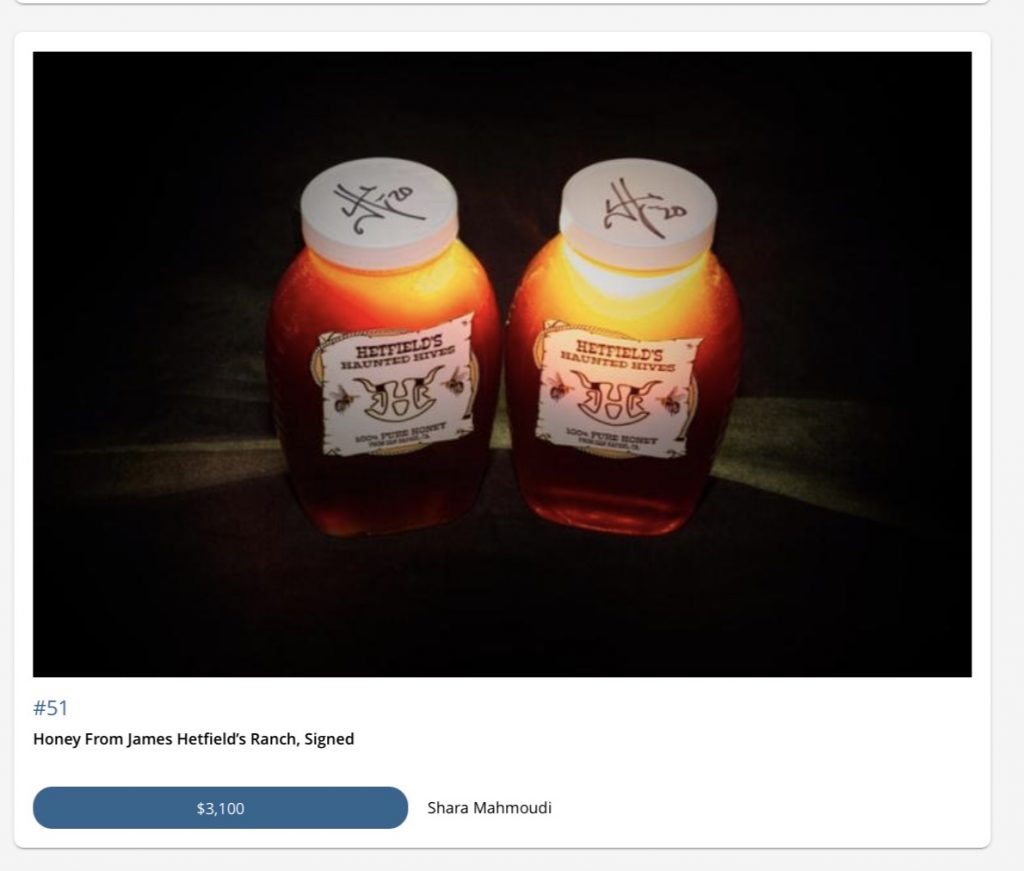
The lead vocalist from Metallica, James Hetfield, is a beekeeper. He donated two jars of honey for the band's "Helping Hands" benefit last November, earning $3,100/pound for COVID-19 and hunger relief. His bandmate's fig/habanero jam only got $2,000. Slacker.
"So tear me open, pour me out."
Winter Meeting 2021 Information
- 2021 February 13 MEETING
LIVE Webinar!
Join the Maryland State Beekeepers Association for a fascinating day packed with insights to honey bees & varroa mites, along with super useful tips for spring management.
WHAT: Keynote Speakers Dr. Thomas Seeley and Celia Davis
DAY: 02/13/2021 Saturday, February 13, 2021
TIME: 8:30AM- 3:30PM
WHERE: On-line via Zoom (CLICK the red zoom link)Limited to 500 participants. Admission is Free (and so is parking!)
AGENDA
SESSION TOPICS PRESENTER 8:30 Welcome Kim Mehalick, MSBA President 8:45 "In Self-Defence" A positive approach to bee health looking at the ability of the colony to resist disease and how we as beekeepers, can help it. Celia Davis, BBKA, National Diploma in Beekeeping 9:45 BREAK 10:00 "How does a honey bee swarm choose it's home?" Dr. Thomas Seeley, Cornell University (retired) 11:00 "What's going on with hives in Maryland." Cybil Preston, Chief MD State Apiary Inspector 11:30 Lunch Break 12:30 "Bait Hives-Getting ready for Spring" Dr. Thomas Seeley, Cornell University (retired) 1:30 Bee Jacket drawing (for Sting Survey participants) Toni Burnham, MSBA Secretary 1:35 Grant to Promote Honey Abby Casarella, Grow & Fortify 1:45 Update from the UMD Bee Squad and vanEngelsdorp Lab. Mark Dykes, UMD Bee Squad 2:15 "Mites under the Microscope" Krisztina Christmon, PhD Student ,UMD vanEngelsdorp Lab 3:00 Closing Question and Answers All
Keynote Speaker THOMAS SEELEY
TALK #1: How a honey bee swarm chooses its home. The bees in a swarm choose a new dwelling place collectively and democratically. They stake their future on a process that includes collective fact-finding, vigorous debate, and consensus building. Seeley will present his research of how these bees evaluate potential nest sites, advertise their discoveries to one another, engage in open deliberation, and choose their new home.
TALK #2: Bait hives: How to get high-quality bees for free. Seeley explains how you can use his research to maximize your chances of capturing a swarm... Learn how to put up a box of the right design, in the right location, and at the right time of year. If you need additional colonies of bees, this is an efficient and fun way to get excellent, locally adapted bees.

THOMAS SEELEY bio
Thomas Seeley, biologist and writer, is a retired professor in the Department of Neurobiology and Behavior at Cornell University. He taught courses on animal behavior and did research on the behavior, social life, and ecology of honey bees. He continues his bee research on a small scale and he continues to be a beekeeper. His scientific work is summarized in five books: Honeybee Ecology (1985), The Wisdom of the Hive (1995), Honeybee Democracy (2010), Following the Wild Bees (2016), and The Lives of Bees (2019). In recognition of his scientific contributions, he has been honored by an Alexander von Humboldt Distinguished U.S. Scientist Award, been awarded a Guggenheim Fellowship, and been elected a Fellow of the American Academy of Arts and Sciences and a Member of the German National Academy of Sciences. He writes: "These honors are much appreciated, but for me the most important source of pleasure in being a scientist are the discoveries that I have made about the lives of honey bees." Seeley earned his AB in chemistry from Dartmouth College in 1974 and his PhD in biology from Harvard University in 1978.FUN FACT: Thomas Seeley started keeping bees while a high school student, when he shook a swarm into a box and brought it home.
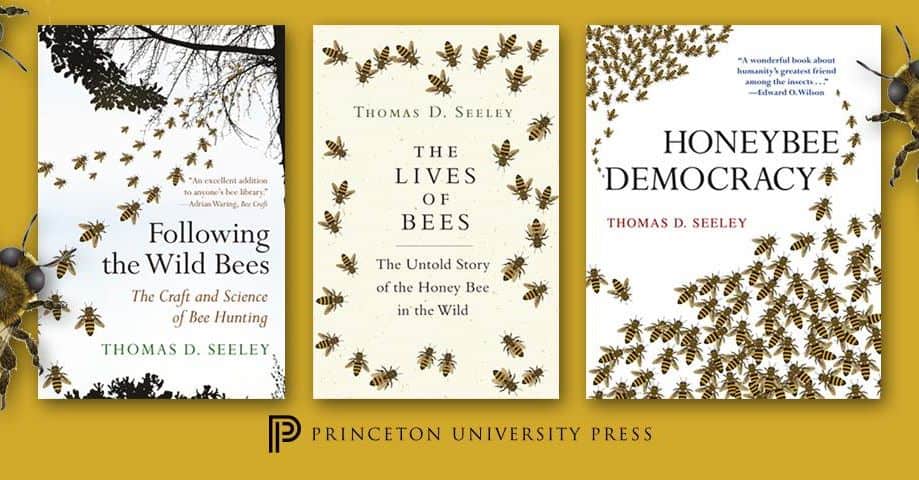
Guest Speaker CELIA DAVIS

Celia Davis, Author and Beekeeper TOPIC: “In Self-Defence” A positive approach to bee health looking at the ability of the colony to resist disease and how we, as beekeepers, can help it.
CELIA DAVIS Bio
Celia Davis is one of the most honored and treasured voices among British beekeepers.
Celia began a lifelong interest in insects as a child and has been keeping bees for more than 35 years.
During that time she has held various posts within the Warwickshire Beekeeper' Association. Celia authored two bee books, The Honey Bee - Around and About, and The Honey Bee Inside Out and lectures throughout the British Isles and Ireland.Celia is partial to nucs, especially for swarm control, and overwinters several with her two full size hives. She lives in Berkswell, near Coventry, in the heart of England.
FUN FACT: When Celia is not involved with bees she enjoys bird watching, and growing fruits and vegetables.
Guest Speaker KRISZTINA CHRISTMON
TOPIC: Mites under the Microscope Christmon has studied over 100,000 mites, analyzing size, physiology, genetics, vectored viruses and resistance to miticide treatments. She will give MSBA attendees a brief overview of mites (origin, genetics, viruses, resistance) then present her latest findings on miticide resistance is related to how recently the mites have eaten!
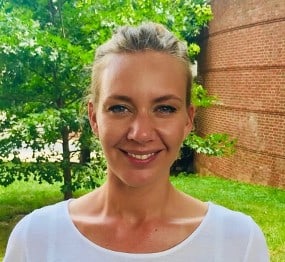
KRISZTINA CHRISTMON bio:
Krisztina Christmon is a Ph.D. student at the Department of Entomology, University of Maryland, College Park. She is conducting her research on Varroa destructor size, physiology and their correlation with miticide resistance at the vanEngelsdorp bee lab, with collaboration of the USDA honey bee lab, Beltsville.
Krisztina studied Agricultural Engineering at the University of West Hungary (BSc, MSc) and Evolutionary and Behavioral Ecology (MSc) at the University of Exeter. Click for Christmond's research update.




